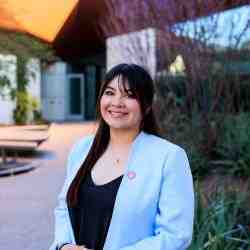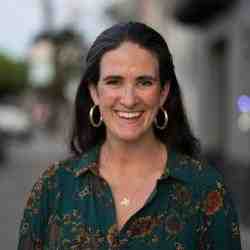Mino Care
https://www.minocare.ca/Introduction
Elsie Amoako is building new knowledge and social infrastructure in Canada, so that Black and racialized women exercise choice over their own reproductive health. In doing so, Elsie creates systems for joyful birthing experiences, restoring birth justice to these communities.
The New Idea
Elsie is restoring choice in the Canadian health care system for African, Caribbean, Black (ACB), and other racialized pregnant and birthing mothers to birth on their own terms. Her innovation enables birth justice and body sovereignty in a system that is not geared towards the ACB parent community needs. Birth justice speaks to the rights of birthing people to recognize their power and agency to make the best health decisions for themselves and their families during all stages of the pregnancy, birth, and the post-birth period. Elsie’s innovation creates the conditions for pregnant mom and birthing persons from ACB and racialized communities to build empowering relationships with their health care providers. She introduces racialized auxiliary workers into mainstream health care and who then influence the nature of care available. Mothers are then able to receive a customized care experience, built on the foundation of anti-Black racism, cultural safety, and reproductive justice. Through her solution, Elsie is surfacing critical voices, and data, to address policies and systems, so that mothers and pregnant women have a transformed birthing experience.
Elsie’s new idea overcomes implicit bias and racism by creating and training care teams of racially alike doulas, midwives, pelvic floor therapists, and clinical therapists. The idea is to complement the mainstream health services with teams of care providers, who are able to determine and provide customized care for the ACB pregnant mom or birthing person. Through this, Elsie creates a cadre of new, professionalized, talent who have legitimate space within the existing health care system, who can advocate for racialized moms and transform birth experiences, one mom at a time. To improve connections and reach, Elsie creates an ecosystem using technology, to facilitate and solidify the relationships between all participants, so that the pregnant mom or birthing person can access care teams from across the country, or world.
As Elsie curates resources – professionals, products, and services – onto her platform, she collects critical data around race-related outcomes and efficacy of the existing maternal health system. Elsie works with her networks to build appropriate protocols and guidelines on how to collect data on ACB and racialized communities. In her first two years, Elsie has reached over 400 mothers in Ontario, convened more than 1000 interested stakeholders from health care, community, and government to prioritize maternal health care for racialized communities, and has emerged as the leading partner for government to ensure maternal services reach underserved ACB communities. Elsie provides data to correct existing maternal and reproductive health policies and programs, thereby building a more equitable system for all pregnant and birthing people in Canada, regardless of race.
Elsie’s new idea overcomes implicit bias and racism by creating and training care teams of racially alike doulas, midwives, pelvic floor therapists, and clinical therapists. The idea is to complement the mainstream health services with teams of care providers, who are able to determine and provide customized care for the ACB pregnant mom or birthing person. Through this, Elsie creates a cadre of new, professionalized, talent who have legitimate space within the existing health care system, who can advocate for racialized moms and transform birth experiences, one mom at a time. To improve connections and reach, Elsie creates an ecosystem using technology, to facilitate and solidify the relationships between all participants, so that the pregnant mom or birthing person can access care teams from across the country, or world.
As Elsie curates resources – professionals, products, and services – onto her platform, she collects critical data around race-related outcomes and efficacy of the existing maternal health system. Elsie works with her networks to build appropriate protocols and guidelines on how to collect data on ACB and racialized communities. In her first two years, Elsie has reached already 400 mothers in Ontario, convened more than 1000 interested stakeholders from health care, community, and government to prioritize maternal health care for racialized communities, and has emerged as the leading partner for government to ensure maternal services reach underserved ACB communities. Elsie provides data to correct existing maternal and reproductive health policies and programs, thereby building a more equitable system for all pregnant and birthing people in Canada, regardless of race.
The Problem
ACB pregnant moms and birthing persons face serious inequalities in maternal health access and life-threatening maternal health outcomes across the globe. Canada has a long history of ACB immigration, leading to a growing population (the Black population doubled over the last 20 years, accounting for 3.5% of Canada’s population). Not all of them are first-generation, with 4 in 10 Black births happening within the country. However, maternal health outcomes of Black women are up to 4 times worse than their white counterparts. Black women see preterm birth rates at 8.9%, compared to 5.9% among white women, a discrepancy similar to the US, which has a higher income gap, and less accessible healthcare (preterm births can occur due to elevated stress hormones in women, usually as a result from the lack of social support)
Some of these outcomes can be traced to fragmented and underutilized maternal health services and lack of adequate prenatal and postnatal education and supports in Canada. For ACB pregnant moms and birthing persons, the challenges in access are further compounded by cultural insensitivity, inexperienced health care providers, and microaggressions from health care practitioners. Lack of safety for racialized patients is an ongoing legacy in Canada; Dr. Helen McMurchy, a Canadian doctor and pioneer in the medical field, was also a prominent eugenicist who played a significant role in politicizing maternal and infant health in the 1920s, while also advocating for increased policing of racialized communities. Dr. McMurchy’s impact continues in biomedical education today, with ACB women experiencing the burden, thereby reducing their level of engagement with health care services. Meanwhile, it remains impossible to know the full extent of the gaps in service coverage by race, due to the lack of race-related data. In fact, race-related data in health-care service provision is not routinely collected, making the extent of the problem relatively unknown.
Alternative lines of care do exist, including private doulas and midwives-services and groups, who are able to support pregnant and birthing persons, and advocate for them in a medical decision-making setting. However, doulas and midwives in Canada are predominantly White and expensive to hire, and doula-serving organizations and midwifery associations are seeing long waitlists due to high demand, and low numbers of certified workers. Research suggests that having a care provider of the same racial background has positive effects on maternal health outcomes. Black doulas and midwives, who could provide critical advocacy for ACB and racialized pregnant people during the birthing process, and function as referral nodes, are a missing link in Canada.
The Strategy
Elsie is creating a health-care ecosystem in Canada that prioritizes healthy relationships between pregnant mothers, auxiliary workers, mainstream clinicians, and government officials, to transform the birthing experience of all mothers. She is creating ACB-led teams of health care workers, including doulas, midwives, pelvic health professionals, lactations consultants, and mental health and psychosocial support workers, and providing incentives for more racialized professionals to enter the health-care workforce. In parallel, through the Mommy Monitor technology platform, she is increasing demand for, and access to pregnancy and birthing services. She solidifies this demand by leveraging government subsidies, as well as utilizing fee-for-service models, to create a thriving marketplace of services for both ACB birthing parents and the care providers themselves. Elsie’s solution increases capacity and willpower in the health-care sector to provide customized care experiences for mothers from diverse minority backgrounds.
The genesis of Elsie’s model emerged from primary research she conducted with people from African, Caribbean, and Latin American communities in Canada, as part of her Master’s thesis at McMaster University, in 2015. Once she completed her thesis, she recommended ten critical components which could equip ACB and racialized pregnant/birthing people to navigate the health system and ensure that the system is customized to build equitable support for them. A year after she made the recommendations, Elsie found that nobody had acted on her recommendation. Feeling an obligation to both her research insights and the communities she worked with, she decided to act on them herself. Following further refinement, she prioritized five of the ten recommendations to focus on. These were: increase monitoring, support care navigation, enhance social security, build cultural sensitivity, and customize care.
Elsie set up Mommy Monitor to provide support for the racialized pregnant mothers or birthing persons to navigate the public health care system, negotiate with their health care provider, and receive care aligned to their particular needs. To do this, Elsie has assembled a new cadre of Maternal Health professionals that include– ACB nurses, ACB doulas/birth workers, and ACB clinicians – who can provide a circle of support to birthing persons during their journeys. The Maternal Health professional serves as the pregnant person’s initial point of contact, provides customized recommendations, and facilitates access to services and resources (for instance, fill-in-the-blanks birth plans) designed to help ACB and racialized parents prepare for and communicate with their health-care provider. Pregnant mothers are provided with knowledge that equips them with questions they can use to ask their current health care provider. They can also consult with the in-house health care provider, doula, or any other professional, and have the option to either build a team to provide extra care and support, and/or determine another pathway for their pregnancy, birth and/or postpartum care.
Elsie has determined that with a growing ACB population, there needs to be a corresponding increase in supply and access to doulas, midwives, and clinicians from ACB backgrounds to support pregnant and birthing persons. She identifies doula and midwife-serving organizations in the cities she works in, provides them with funding and a cultural safety training curriculum. In doing so she encourages and supports them to improve skills to effectively advocate for ACB women and onboards them to the Mommy Monitor platform.
Elsie has consolidated these services on the Mommy Monitor technology platform, which she is deploying in ‘manual’ mode in 2021, with the mobile application rolling out late 2021. Connections between auxiliary workers and pregnant mothers are facilitated through this platform, with Elsie charging subscription fees based on the quantity and length of the interactions. Elsie continues to work towards Mommy Monitor being in a position to be contracted by the Ministry of Health to offer services through clinics, hospitals and organizations for their patient populations without cost. For current care offerings, Elsie has negotiated with her partner networks of care workers for reduced costs and discounts for mothers accessing their services through her platform, while leveraging government grants to provide subsidies for mothers who would not be able to afford pregnancy services otherwise. In 2021, the connections are primarily facilitated by Elsie and her team through her website, with a smartphone application launching later in the year which will automate much of this functionality.
Elsie creates demand for better equity in birthing outcomes, by offering regular Birth and Reproductive Justice workshops through which ACB and racialized moms/families learn to protect their rights in the Canadian health care system. For many of Elsie’s participants, this is the first time they realize that they had less-than-optimal birth experiences. Elsie uses this platform to reinforce birthing persons to not blame themselves for these birth experiences. Mommy Monitor organizes an annual National Racialized Maternal health conference, convening more than 1200 government, civil society, and health care partners and stakeholders. Elsie has built this as a collaborative space for these stakeholders to come together to work on issues of access and health care quality for vulnerable people in Canada. The conference is becoming a crucial element in the maternal health landscape in Ontario and is leading to the development of the first Black Maternal Health Caucus. Elsie sees this Caucus as critical to build support for integrating ACB and racialized care teams into current provincial and federal health policies. This includes working towards provincial health insurance (like the Ontario Health Insurance Plan) paying for doula services, and the inclusion of pelvic floor therapy in public coverage. Elsie sees this as a critical next step to move birth-support services into the existing health system.
Across the board, Elsie thus breaks isolation between the different stakeholders: mothers, doulas, health care practitioners, academics, and government. And she is showing early signs of impact. In the first year of her launch of the current services (2019-2020), Elsie has achieved greater equity in the maternal health care experience for 400 pregnant/birthing persons, mostly in Canada’s largest province, Ontario. She has been able to raise money from a range of government departments, including Ministries of Health, and Community Services, to pay for auxiliary services that support racialized communities, having supported over 30 workers. Elsie has smartly leveraged on existing budget-line items, by positioning herself as a virtual version of a community-health centre model, so that her model becomes seen as part of the ambit of governmental service delivery. This gives ACB health care workers an economically viable reason to ‘consult’ to the health care system, as opposed to operating in isolation of it. While this system acts adjacent and complementary to the mainstream health system, Elsie imagines her platform ushering more and more racialized health care workers into this sector, further breaking down the isolation, and normalizing customized care for different minorities.
Further, Elsie is currently focused on building strategies to collect data ethically from the communities she engages with. Unlike mass data collection exercises conducted by government and big Pharma, which primarily focus on surveillance, Elsie prioritizes community and individual safety and decentralized data collection techniques. She has been able to use her relationships with communities to already build data points to learn about how to improve pandemic-related access for Black birthing persons to health-care support during the pandemic. She has built strong partnerships with academia, to build protocol to guide future data collection activities with racialized communities in culturally safe, and ethical ways. With these partnerships, Elsie is building relationships to continue advocating for integration of reproductive and birth rights in the current care system.
Mommy Monitor’s whole ecosystem, where human relationships are built and nurtured, is sustained through Elsie’s online and virtual platform, that utilizes components of telemedicine to enable cross-geography care teams. Elsie envisions her services becoming more automated as she transitions into a full mobile suite of applications, which she plans to grow by increasing subscriptions and working with birth centers and clinics to reach patients. As she improves her technology offering, Elsie sees it evolving to offer intelligent referral systems, anticipating pregnancy complications, and becoming an integral support to care providers and pregnant and birthing persons across the board. In due course, Elsie sees herself as being able to extend the service to all provinces in Canada, before making it available globally.
The Person
Elsie’s journey and commitment to healthcare began when she visited Ghana with her family in Grade 11. During her trip a relative contracted malaria, and Elsie saw the devastating effect of the disease, especially that relative had the genetic condition of Sickle Cell Anemia. This experience prompted Elsie into further enquiry into Sickle Cell Anemia as part of her studies. Elsie discovered that Sickle Cell Anemia is primarily characterized as a Black disease. While other communities struggle with other-race specific diseases, Elsie noted that they built social networks, resources, and infrastructure to manage, and support people with the conditions. This, she found, was missing with the Black communities in Canada, and in extension, the US.
As she continued her studies, Elsie went back to Ghana, where she worked with young girls who were in sex work. Many of them were mothers. Elsie worked with clinics to support their health needs. When she returned to Toronto, she found the needs of mothers in her community were similar. After being exposed to global perspectives on maternal health she decided to focus on this topic for her master’s thesis, leading her to identify the key drivers for better maternal care for Black birthing persons.
After continuing to work with Black families living in priority communities in Ontario, it became apparent that their experiences were drastically disproportionate and there was a need to focus on the Black family unit in policy. Elsie went on to do further graduate education on racialized maternal health which she viewed as an integral opportunity to build the potential of Mommy Monitor, while reinforcing her commitment to creating space for Black persons to have autonomy over their health, bodies, lives, and decisions made about them.



